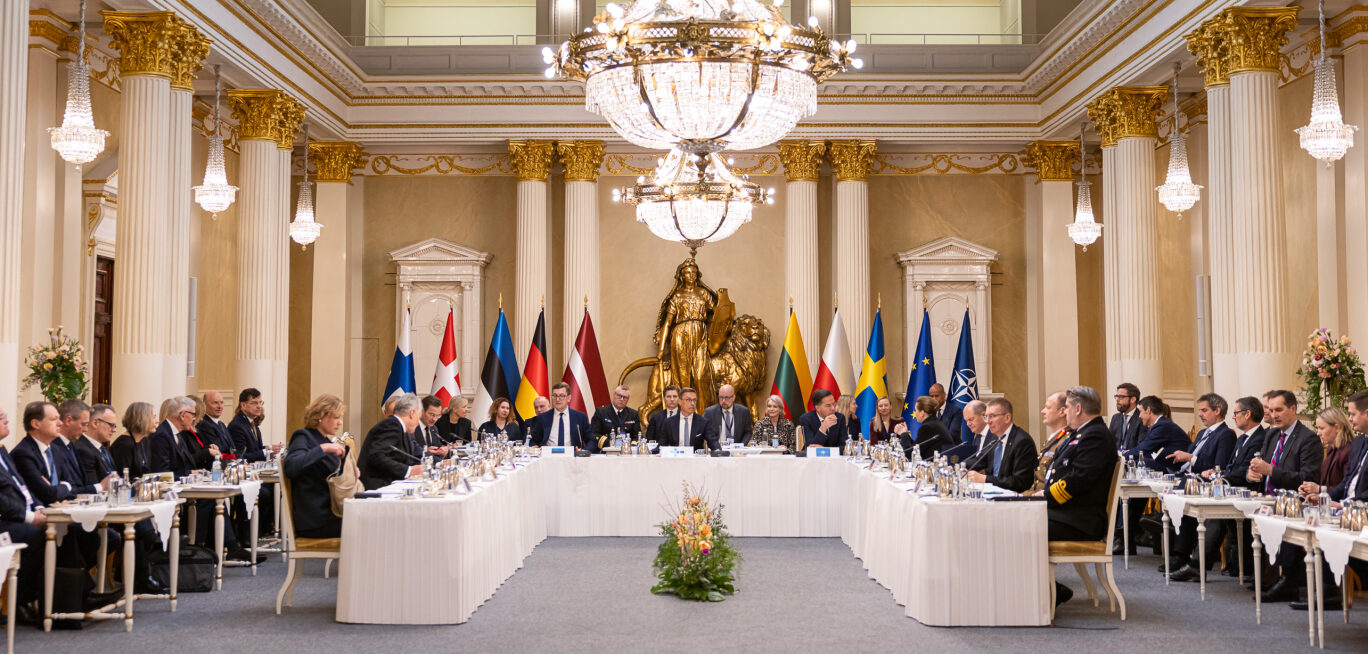President of Finland Alexander Stubb, Prime Minister of Estonia Kristen Michal, Prime Minister of Denmark Mette Frederiksen, Federal Chancellor of Germany Olaf Scholz, President of Latvia Edgars Rinkēvičs, President of Lithuania Gitanas Nausėda, Prime Minister of Poland Donald Tusk and Prime Minister of Sweden Ulf Kristersson have issued a joint statement in the presence of NATO Secretary General Mark Rutte and Executive Vice-President of the European Commission Henna Virkkunen at the Baltic Sea NATO Allies Summit in Helsinki on Tuesday 14 January 2025.
We, the Heads of State or Government of Denmark, Estonia, Finland, Germany, Latvia, Lithuania, Poland and Sweden, have met today in Helsinki, in the presence of the Secretary General of NATO and the Executive Vice President of the European Commission, to address the recent increase in serious incidents damaging critical undersea infrastructure in the Baltic Sea.
We are deeply concerned by actions, be they negligent or malicious, which cause damage to or threaten the functioning of critical undersea infrastructure. We strongly condemn acts of sabotage to critical undersea infrastructure.
We are determined to deter, detect and counter any attempts at sabotage. Any attack against our infrastructure will be met with a robust and determined response. We stand ready to attribute hostile actions committed by malign actors, as appropriate.
We welcome that NATO has launched the enhanced Vigilance Activity “Baltic Sentry” to improve situational awareness and deter hostile activities. We welcome the efforts of Allies to deploy additional assets at sea, in the air, on land and below the surface of the sea, to enhance vigilance and deterrence. The Commander Task Force-Baltic in Rostock has been activated and coordinates Allied ships in the Baltic Sea. NATO´s Maritime Centre for the Security of Critical Undersea Infrastructure and NATO´s Critical Undersea Infrastructure Network will support efforts to protect and secure vital undersea assets.
Moreover, the involved nations are coordinating the employment of different options and assets. As an example, the Commander Task Force-Baltic works towards establishing an integrated regional picture on critical infrastructure in the Baltic Sea that contributes to NATO’s work in protecting critical undersea infrastructure.
We continue to strengthen our deterrence and defence, modernise our capabilities, recognising the urgent need for increased defence expenditure to address and counter evolving security threats.
We will work, including within the NATO framework, to begin deploying innovative solutions, developing new technologies for surveillance and tracking of suspicious vessels and undersea monitoring. This will include enhanced partnerships with the private sector, in particular infrastructure operators and cutting-edge technology companies. We will actively exchange information, track and assess incidents to analyse trends, and share best practices of our response.
We remain prepared to act individually and collectively to protect our critical undersea infrastructure and increase resilience, including by building on and expanding the existing NATO-EU cooperation. We welcome additional measures undertaken by Allies and partners to strengthen security in our region, which reinforce existing and planned NATO responses.
Together, we will identify further measures in accordance with international law of the sea, including the freedom of navigation, to prevent and effectively respond to willful damaging of critical undersea infrastructure or irresponsible behaviour. Such behaviour interferes, inter alia, with the freedom to lay cables and pipelines and poses a significant risk to the marine environment. We will also take actions for accountability and stronger enforcement against those responsible for damaging undersea infrastructure, including compensation for damage.
We will take further steps to enhance resilience of our communications network and energy infrastructure, including reliable supply chains, enhancing physical and cybersecurity measures, developing European undersea surveillance capabilities and swift repair capacity, engaging with the private sector. We will work towards a Memorandum of Understanding on Critical Infrastructure Protection in the region.
Combatting breakage of undersea cables and pipelines represents a global problem. We urge all States to adhere to their obligations to adopt laws and regulations necessary to provide that the breaking of or injury to a cable or pipeline in the high seas or exclusive economic zones by a ship flying their flag or by a person subject to their jurisdiction shall be a punishable offence, and to prosecute as appropriate.
Russia´s use of the so-called shadow fleet poses a particular threat to the maritime and environmental security in the Baltic Sea region and globally. This reprehensible practice also threatens the integrity of undersea infrastructure, increases risks connected to sea-dumped chemical munitions, and significantly supports funding of Russia’s illegal war of aggression against Ukraine.
We are taking robust steps to address these threats. We reserve our rights, in accordance with international law, to take action against any suspected vessels that circumvent sanctions and threaten our security, infrastructure and the environment. In close coastal state co-operation, we are increasing surveillance of the vessels, including the inspections of vessel insurance certificates. Additionally, further measures, including the introduction of tracking tools and the extension of sanctions targeting the shadow fleet, will be put into practice. We encourage further EU-NATO cooperation in responding to the threats caused by the reckless activities of vessels serving Russian cargo flow.
Increasing the security of the Baltic Sea and its critical undersea infrastructure is a joint interest for the Alliance and the EU. Through our joint actions, as outlined in this declaration, we actively contribute to efforts to secure and safeguard our undersea critical infrastructure, thereby strengthening NATO’s collective efforts and advancing NATO’s ongoing work, including the renewal of NATO’s maritime strategy, as we approach the NATO Summit in the Hague.
Hostile or reckless actions against critical undersea infrastructure or other critical infrastructure are not limited to the Baltic Sea region. We will ensure coherence and coordination and intensify cooperation to strengthen security in the whole Alliance.

